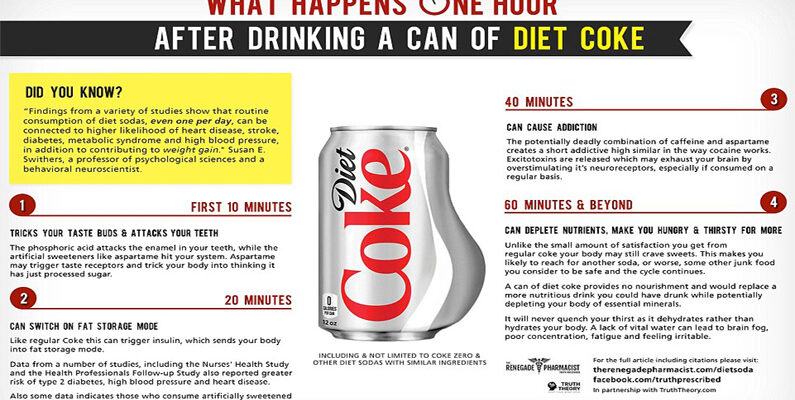For years, calorie-free sodas have been championed as the guilt-free alternative for those watching their sugar intake or managing weight. The marketing was clear: enjoy the sweet taste without the caloric cost. But what if this seemingly innocuous swap was, in fact, laying a more insidious trap for your health? Recent Australian research has peeled back the layers of this sugary illusion, revealing a startling truth that demands our immediate attention: diet drinks may pose a greater risk for Type 2 Diabetes than their full-sugar counterparts.
The Unexpected Revelation
A comprehensive study spanning nearly 14 years and involving over 36,000 participants aged 40 to 69 has delivered a significant blow to the “diet-friendly” narrative. Conducted by a collaborative team from Monash University, RMIT University, and the Cancer Council Victoria, this research, published in the esteemed journal Diabetes & Metabolism, indicates that a mere single glass of calorie-free soda per day could elevate your risk of developing Type 2 Diabetes by a staggering 38 percent. To put this into perspective, traditional sugary lemonades, long demonized for their sugar content, increased the risk by “only” 23 percent.
This finding is not just surprising; it`s a paradigm shift. For decades, the prevailing wisdom has been that swapping sugar for artificial sweeteners was a step towards better health, particularly for individuals concerned about blood sugar regulation. It appears we may have been inadvertently steering ourselves—and public health policy—down a rather misguided path.
Unpacking the Mechanism: More Than Just Calories
One of the most compelling aspects of this study is its robustness. The researchers meticulously accounted for various confounding factors, including participants` Body Mass Index (BMI). Even after adjusting for BMI, the direct correlation between “diet” beverages and Type 2 Diabetes persisted. This critical detail suggests that the link isn`t simply about managing weight or calorie intake, but rather a more fundamental, direct interference with metabolic processes by the artificial sweeteners themselves.
While the exact biological mechanisms are still being fully elucidated, scientists hypothesize that artificial sweeteners might:
- Alter Gut Microbiome: Certain sweeteners have been shown to impact the delicate balance of gut bacteria, which plays a crucial role in metabolism and glucose regulation.
- Induce Insulin Resistance: Despite not containing sugar, the intensely sweet taste might still trigger an insulin response, potentially leading to insulin resistance over time.
- Change Taste Perception: Constant exposure to hyper-sweet artificial flavors could alter our taste buds, leading to a preference for intensely sweet foods and a reduced enjoyment of naturally sweet, healthier options.
It`s a subtle irony, isn`t it? We reach for the “zero-sugar” option, believing we`re making a virtuous choice, only to find our metabolism might be quietly protesting the artificial sweetness with a higher risk of a chronic condition.
Implications for Public Health and Policy
The findings from this Australian study are a clarion call for a serious reevaluation of public health strategies. For too long, the focus has predominantly been on sugar taxes and restrictions, which are undeniably important. However, the emerging evidence strongly suggests that artificial sweeteners, often marketed as a benign alternative, should no longer be exempt from similar scrutiny.
Specialists involved in the research are now urging policymakers to broaden their scope. This could mean:
- Implementing taxation on artificial sweeteners akin to sugar taxes.
- Developing clearer labeling requirements that accurately reflect potential health risks.
- Launching public awareness campaigns to educate consumers about the nuanced risks of all types of sweetened beverages, rather than simply promoting “diet” options as universally safe.
The message is clear: true health alternatives are not found in laboratories synthesizing novel sweeteners, but often in nature`s simplest offerings – water, unsweetened tea, or naturally flavored beverages.
Looking Ahead: A Broader Perspective
This research serves as a potent reminder that the pursuit of health is an ongoing scientific journey, full of evolving understandings and occasional reversals of perceived wisdom. Just as we once embraced trans fats as healthier alternatives to butter, only to later discover their cardiovascular devastation, we are now confronted with the complex reality of artificial sweeteners.
Ultimately, this study reinforces the importance of mindful consumption and highlights that when it comes to our diet, “less is more” often applies not just to calories, but to highly processed and artificially engineered ingredients. Perhaps the real “sweet spot” for health lies not in mimicking nature`s flavors with chemicals, but in appreciating the genuine, unadulterated taste of simplicity.








